When Is It Too Late for Cat Socialization?
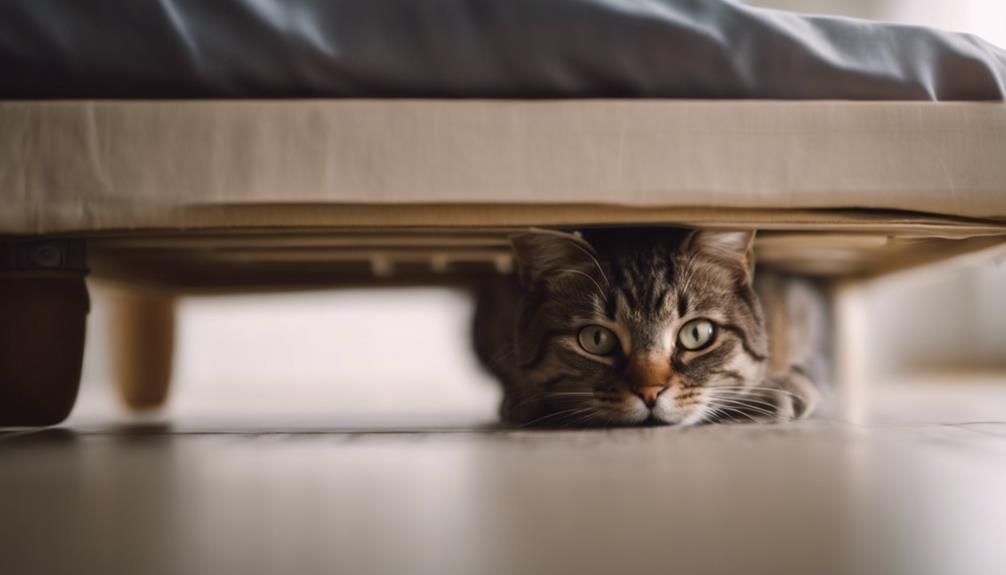
It's never too late to socialize a cat!
With patience, understanding, and the right approach, even older or aloof cats can become more sociable and enjoy a harmonious relationship with their owners.
If a cat hasn't been properly socialized, signs of unsocialization may become apparent early in their behavior. Early intervention is crucial in addressing these behaviors through behavior modification techniques. Signs of unsocialized cats may include fear or aggression towards humans or other animals, excessive hiding, inability to adapt to new environments, and difficulty with handling or grooming.
To improve socialization progress, positive reinforcement is key. This involves rewarding desired behaviors with treats, toys, or affection to encourage the cat to repeat those behaviors. Consistency and patience are essential when working with unsocialized cats, as progress may be slow but is achievable with the right approach.
Factors Affecting Socialization Opportunities
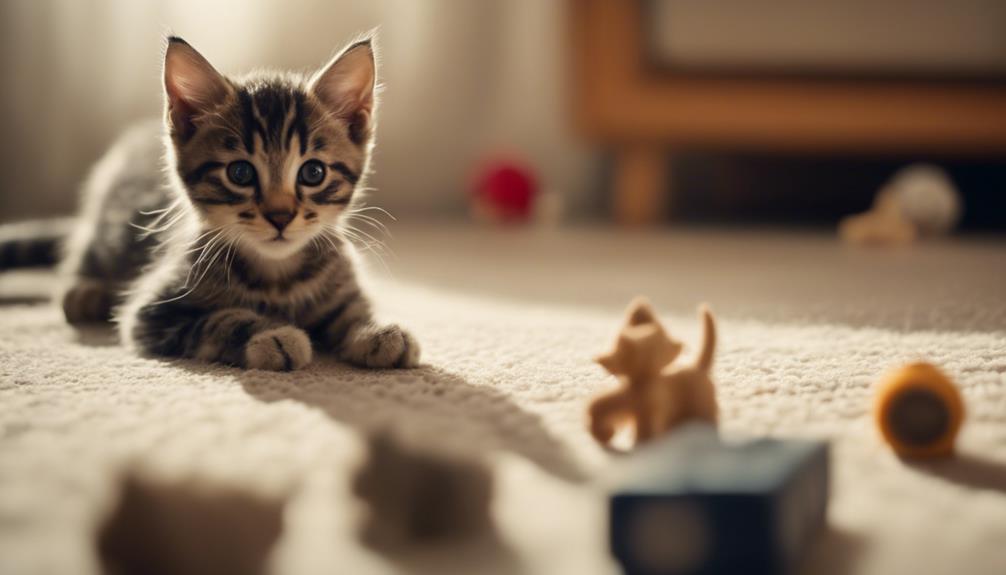
When considering socializing cats, it's crucial to acknowledge how age can impact their willingness to engage with others and their environment's influence on their behavior.
These factors play a significant role in shaping a cat's socialization opportunities and overall comfort levels in various situations.
Understanding these aspects can help cat owners create a supportive environment for their feline companions to thrive socially.
Age Impact on Socialization
As cats age, the opportunities for socialization may be influenced by various factors that impact their ability to interact with others. Early intervention plays a crucial role in shaping the social behavior of senior cats, helping them adapt to new situations and individuals. On the other hand, socialization barriers can be more pronounced in elderly felines due to potential health issues, decreased mobility, or past negative experiences. It's essential to understand these age-related nuances to provide appropriate support and enrichment for aging cats. Below is a table highlighting some key differences in socialization opportunities between senior cats and elderly felines:
| Senior Cats | Elderly Felines |
|---|---|
| Easier adaptation to new environments | Greater health concerns |
| Increased willingness to interact with others | Reduced mobility |
| More receptive to positive social experiences | Higher likelihood of past trauma |
| Responsive to gentle socialization techniques | Require more patience and understanding |
| Benefit from regular social interaction | May prefer solitude at times |
Environment Influence on Socialization
Understanding the impact of the environment on socialization is crucial for providing appropriate support and enrichment for cats of all ages. Outdoor vs. indoor socialization plays a significant role in a cat's ability to interact with other animals, humans, and their surroundings.
Indoor cats may have limited exposure to new experiences, requiring intentional efforts to create varied stimuli for socialization. On the other hand, outdoor cats may naturally encounter a broader range of socialization opportunities.
In multi-pet households, dynamics among different animals can influence a cat's socialization process. Monitoring interactions, providing safe spaces, and promoting positive relationships are essential for fostering healthy socialization in these environments.
Behavioral Challenges in Adult Cats
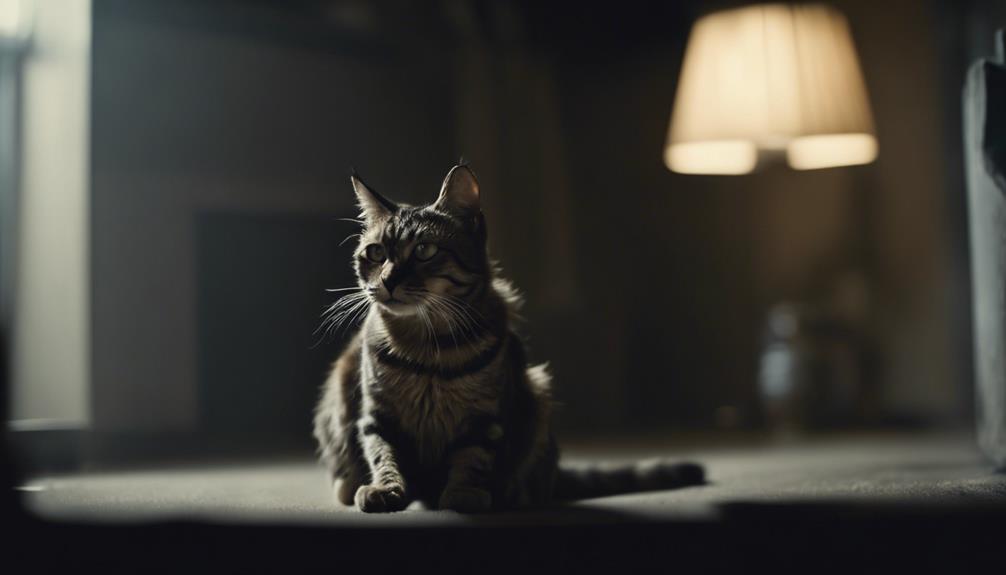
Addressing behavioral challenges in adult cats can be a complex and delicate process.
Adult cat socialization obstacles often stem from past experiences, requiring patience and understanding to rebuild trust.
It's crucial to approach these challenges with empathy and a willingness to adapt to the individual needs of each cat.
Adult Cat Socialization Obstacles
Overcoming behavioral challenges in adult cats often requires patience and consistency from their caregivers. Adult cats may face obstacles when it comes to socialization due to past experiences or lack of exposure.
Here are three key points to consider when addressing these challenges:
- Slow and Gentle Approach: Adult cats may need more time to adjust to new situations or people. Rushing the process can lead to increased stress and resistance.
- Positive Reinforcement: Using treats, toys, or favorite activities can help create positive associations with social interactions, encouraging more sociable behavior.
- Professional Guidance: In some cases, consulting with a veterinarian or animal behaviorist can provide valuable insight and tailored strategies for helping adult cats overcome their behavioral hurdles.
Rebuilding Trust in Cats
In rebuilding trust with adult cats facing behavioral challenges, caregivers can establish a safe and predictable environment to help encourage positive interactions.
Creating a consistent routine with feeding times, play sessions, and quiet spaces can aid in rebuilding trust gradually. It's essential to approach the cat calmly, using gentle movements and soft voices to avoid triggering fear or aggression.
Patience is key, as rebuilding trust takes time and can't be rushed. Offering treats and using positive reinforcement techniques can also help in fostering a sense of security and comfort for the cat.
Patience With Behavioral Changes
Establishing patience is crucial when navigating behavioral changes in adult cats, especially when faced with challenges that require understanding and time to address effectively. It's essential to approach these situations with empathy and a willingness to adapt.
Here are three key points to consider:
- Handling setbacks: Cats, like humans, can experience setbacks in their behavioral progress. It's important to remain patient and consistent in your approach, even when faced with challenges.
- Building confidence: Adult cats may need time to build confidence, especially if they've experienced trauma or neglect. Providing a safe and supportive environment can help them overcome their fears and develop trust.
- Consistency is key: Consistent routines and positive reinforcement are vital in helping adult cats adjust to behavioral changes. By remaining patient and steadfast in your efforts, you can support your feline companion in their journey towards positive behavioral transformation.
Techniques for Socializing Older Cats
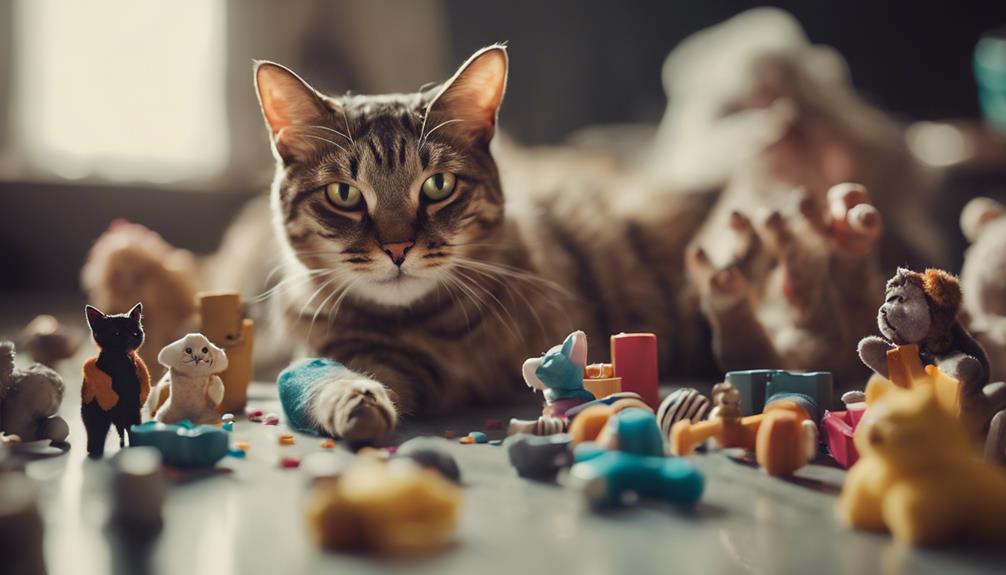
Utilizing gentle and gradual exposure techniques can help older cats become more comfortable and sociable in their environment. Senior cats may have had limited socialization experiences, making it essential to approach their trust-building process with patience and understanding. One effective method is creating safe spaces where they can retreat and observe their surroundings before engaging further. Placing familiar scents, such as their bedding or toys, in these areas can provide comfort and aid in the adjustment process.
Another valuable technique is engaging in interactive playtime using toys that encourage bonding and movement. This not only helps in building a positive association with human interaction but also promotes physical activity, benefiting the cat's overall well-being. Additionally, offering treats or favorite foods during these play sessions can reinforce positive behavior and strengthen the bond between the cat and their caregiver.
Importance of Patience and Consistency

Demonstrating patience and maintaining consistency are key factors in successfully socializing older cats. It's essential to understand that older cats may take longer to adapt to new socialization techniques due to ingrained behaviors. Here are three crucial points to consider:
- Consistent training: Consistency is vital when socializing older cats. Establishing a routine helps them feel secure and understand what's expected of them. Regular positive interactions will gradually build trust and confidence.
- Patience pays: Older cats may have had previous negative experiences or simply be set in their ways. Patience is crucial during the socialization process. Rushing or becoming frustrated can hinder progress. Give your feline companion the time they need to adjust and learn to trust.
- Celebrate small victories: Socializing older cats can be a slow process, but celebrating even the smallest improvements is important. Recognizing and rewarding positive behaviors encourages further progress and strengthens the bond between you and your cat.
Seeking Professional Help if Needed
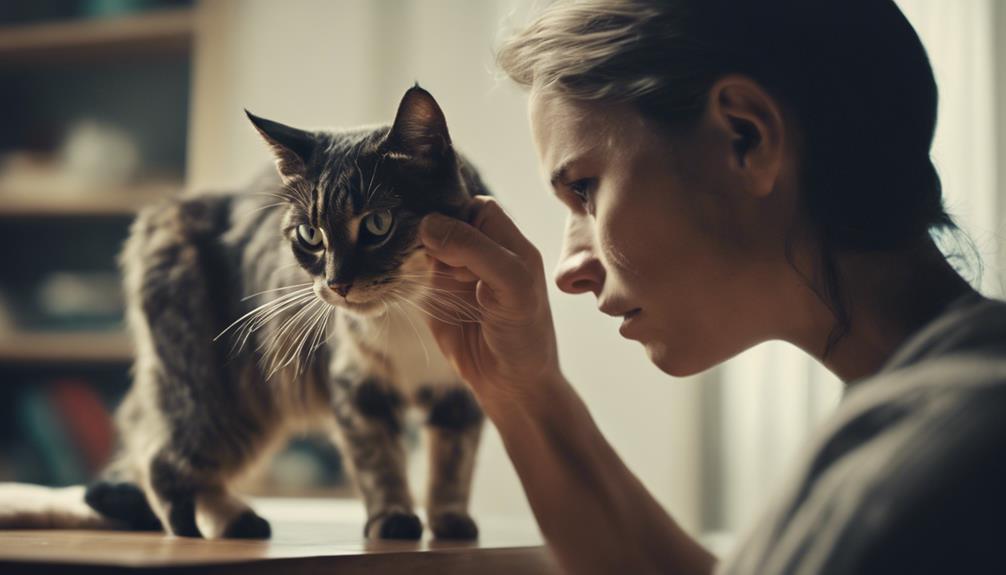
Professional assistance can be invaluable when socializing older cats, especially if you encounter challenges beyond your expertise. Seeking professional guidance can make a significant difference in the behavioral progress of your furry friend. Trained experts can provide you with the necessary tools and techniques to address specific issues that may arise during the socialization process.
Expert advice is crucial for ensuring socialization success, especially with older cats who may have ingrained behaviors that are harder to change. These professionals have the experience and knowledge to tailor a socialization plan to suit your cat's individual needs, increasing the likelihood of a positive outcome.
If you find yourself struggling or feeling overwhelmed while trying to socialize your older cat, don't hesitate to reach out for help. Professional behaviorists or trainers can offer insights and strategies that align with best practices in animal behavior. Remember, you aren't alone in this journey, and seeking assistance is a proactive step towards creating a harmonious relationship with your cat.
Celebrating Small Socialization Wins
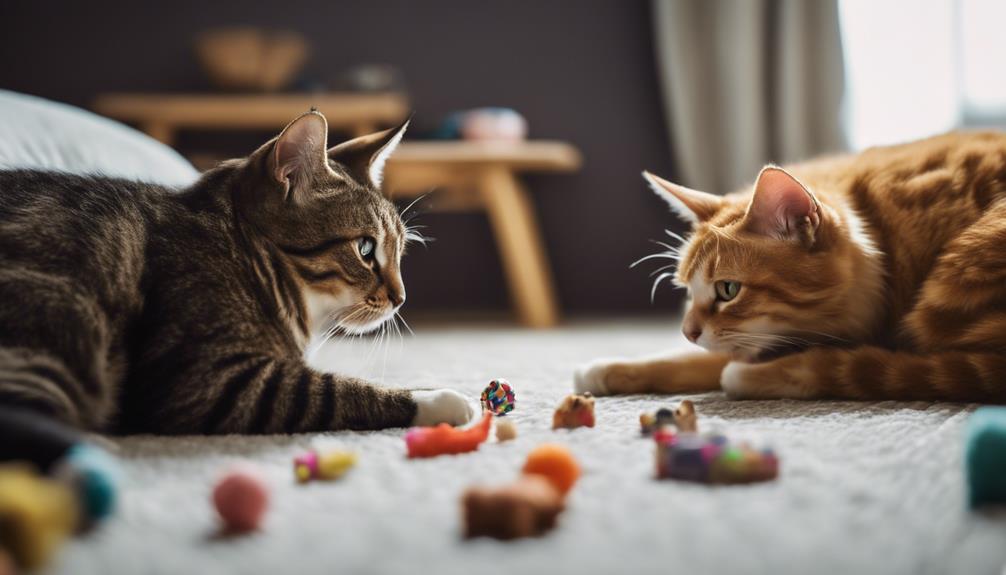
When facing challenges in socializing an older cat, acknowledging and celebrating small wins can boost both the cat's confidence and the owner's morale. Progress may be slow, but every step forward is a reason to rejoice.
Here are three ways celebrating small socialization wins can make a significant impact:
- Boosting Confidence: By acknowledging and celebrating small victories, the cat starts to build confidence in social interactions, making further progress more achievable.
- Strengthens Bond: Celebrating milestones, no matter how small, creates a positive environment that strengthens the bond between the cat and the owner, fostering trust and companionship.
- Encourages Persistence: Recognizing even minor improvements encourages the owner to persist in their efforts, knowing that their hard work is paying off and motivating them to continue the socialization process with patience and dedication.
Frequently Asked Questions
Can a Cat's Past Experiences Affect Their Ability to Be Socialized, Even if They Are Still Young?
Early trauma can impact a cat's socialization, but their resilience often allows for improvement. With behavior therapy and rehabilitation, even young cats can overcome past experiences and learn to be more social.
Are There Any Specific Breeds of Cats That Are More Difficult to Socialize Than Others?
Some cat breeds may present genetic predispositions or behavioral challenges that make socialization more challenging. However, with patience and appropriate socialization techniques, most cats, regardless of breed, can learn to be more social and trusting.
How Can a Cat's Environment Impact Their Socialization Process?
Influenced by their surroundings, a cat's environment plays a crucial role in behavior modification and socialization. Enrichment activities, positive reinforcement, and trust-building techniques can create a supportive atmosphere for cats to thrive socially.
Are There Any Alternative Methods for Socializing Cats That May Be More Effective for Certain Individuals?
Behavior modification techniques such as fear desensitization and positive reinforcement methods like clicker training can be effective for socializing cats. Each feline is unique, and tailored approaches can make a significant impact.
Is It Possible to Reverse the Effects of Lack of Socialization in Older Cats, or Is It Too Late Once They Reach a Certain Age?
It's never too late to improve a cat's socialization through age-appropriate training techniques and bonding exercises. Behavior modification can help older cats adjust and form connections, enhancing their quality of life.










